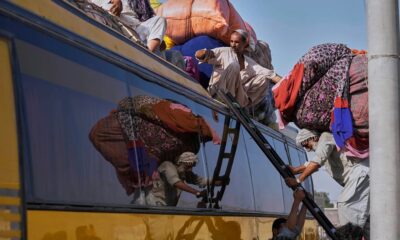COVID-19
As COVID-19 rages in India, scientist warns further waves ‘inevitable’
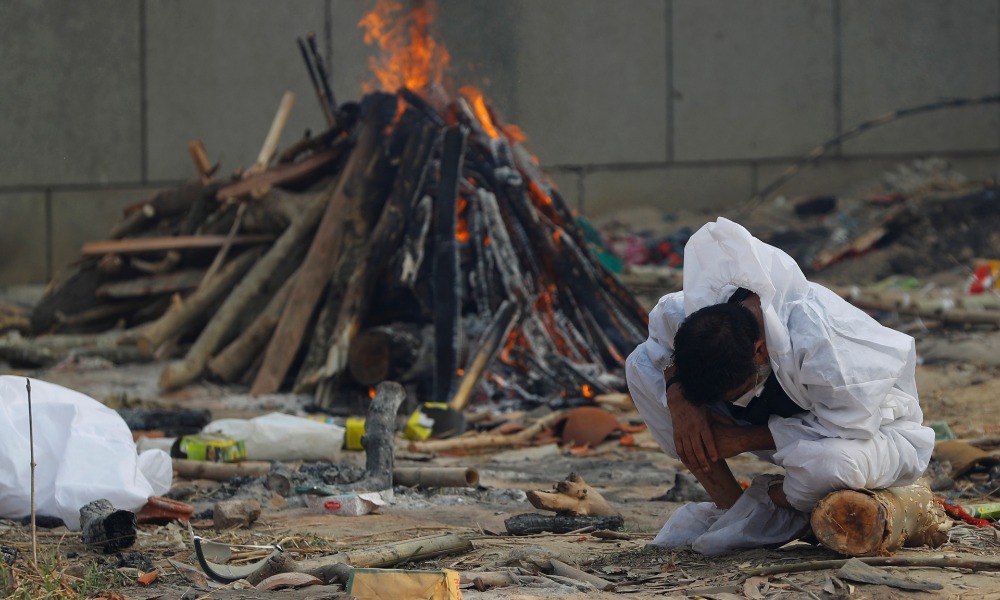
A top scientific adviser to the Indian government warned on Wednesday the country would inevitably face further waves of the coronavirus pandemic, as almost 4,000 people died in the space of a day.
With hospitals scrabbling for beds and oxygen in response to a deadly second surge in infections, the World Health Organization said in a weekly report that India accounted for nearly half the coronavirus cases reported worldwide last week and a quarter of the deaths.
Many people have died in ambulances and car parks waiting for a bed or oxygen, while morgues and crematoriums struggle to deal with a seemingly unstoppable flow of bodies.
The government’s principal scientific adviser, K. VijayRaghavan, warned that even after infection rates subside the country should be ready for a third wave.
“Phase 3 is inevitable, given the high levels of circulating virus,” he told a news briefing. “But it is not clear on what timescale this phase 3 will occur… We should prepare for new waves.”
Prime Minister Narendra Modi’s government has been widely criticised for not acting sooner to suppress the second wave, after religious festivals and political rallies drew tens of thousands of people in recent weeks and became “super spreader” events.
“We are running out of air. We are dying,” the Booker Prize-winning author Arundhati Roy wrote in an opinion piece that called for Modi to step down.
“This is a crisis of your making,” she added in the article published on Tuesday. “You cannot solve it. You can only make it worse….So please go.”
India’s delegation to the Group of Seven foreign ministers’ meeting in London is self-isolating after two of its members tested positive for COVID-19, Britain said on Wednesday
Foreign Minister Subrahmanyam Jaishankar, who is in London, said in a Twitter message that he would attend virtually.
GOVERNMENT RESISTING LOCKDOWN
Deaths rose by a record 3,780 during the past 24 hours, health ministry data showed, and daily infections rose by 382,315 on Wednesday. The number has been in excess of 300,000 every day for the past two weeks.
Medical experts say India’s actual figures could be five to 10 times the official tallies. The country has added 10 million cases in just over four months, after taking more than 10 months to reach its first 10 million.
The opposition has urged a nationwide lockdown, but the government is reluctant to impose one for fear of the economic fallout, although several states have adopted social curbs.
In the latest move the eastern state of West Bengal, where voters dealt Modi’s party a defeat in an election last week, suspended local train services and limited working hours for banks and jewellery shops, among its steps to limit infections.
The central bank asked banks on Wednesday to allow more time for some borrowers to repay loans, as the crisis threatens a nascent economic revival.
FALL IN VACCINATIONS, TESTING
The surge in infections has coincided with a dramatic drop in vaccinations because of supply and delivery problems, despite India being a major vaccine producer.
At least three states, including Maharashtra, home to the commercial capital of Mumbai, have reported a scarcity of vaccines, shutting down some inoculation centres.
Lengthy queues formed outside two centres in the western city that still have vaccine supplies, and some of those waiting pleaded for police to open their gates earlier.
The government said production capacity for the antiviral drug remdesivir, used to treat COVID-19 patients, has trebled to 10.3 million vials per month, up from 3.8 million vials a month ago.
But daily testing has fallen sharply to 1.5 million, state-run Indian Council of Medical Research said, off a peak of 1.95 million on Saturday.
OUTBREAK SPREADING
Two “oxygen express” trains carrying liquid oxygen arrived in the capital, New Delhi, on Wednesday, railways minister Piyush Goyal said on Twitter. More than 25 trains have distributed oxygen supplies nationwide.
The government says supplies are sufficient but transport woes have hindered distribution.
Meanwhile, the outbreak continues to spread.
In the remote state of Mizoram bordering Myanmar, beds in its biggest coronavirus hospital are in such short supply that all victims of other diseases have been asked to leave, said government official Dr Z R Thiamsanga.
Just three of a total 14 ventilators were still available.
“In my opinion, a complete lockdown is required to control the situation,” he told Reuters from the state capital, Aizawl.
Neighbouring Nepal is also being overwhelmed by a surge of infections as India’s outbreak spreads across South Asia, the International Federation of Red Cross and Red Crescent Societies said.
With 57 times as many cases as a month ago, Nepal is seeing 44% of tests come back positive, it added. Towns near the border with India are unable to cope with the growing numbers seeking treatment, while just 1% of its population was fully vaccinated.
COVID-19
WHO declares end to COVID global health emergency

The World Health Organization said Friday that COVID-19 no longer qualifies as a global emergency, marking a symbolic end to the devastating coronavirus pandemic that triggered once-unthinkable lockdowns, upended economies and killed millions of people worldwide.
The announcement, made more than three years after WHO declared the coronavirus an international crisis, offers some relief, if not an ending, to a pandemic that stirred fear and suspicion, hand-wringing and finger-pointing across the globe, AP reported.
The U.N. health agency’s officials said that even though the emergency phase was over, the pandemic hasn’t finished, noting recent spikes in cases in Southeast Asia and the Middle East.
WHO says thousands of people are still dying from the virus every week, and millions of others are suffering from debilitating, long-term effects.
“It’s with great hope that I declare COVID-19 over as a global health emergency,” WHO Director-General Tedros Adhanom Ghebreyesus said.
“That does not mean COVID-19 is over as a global health threat,” he said, warning that new variants could yet emerge. Tedros noted that while the official COVID-19 death toll was 7 million, the real figure was estimated to be at least 20 million.
Tedros said the pandemic had been on a downward trend for more than a year, acknowledging that most countries have already returned to life before COVID-19.
He bemoaned the damage that COVID-19 had done to the global community, saying the pandemic had shattered businesses, exacerbated political divisions, led to the spread of misinformation and plunged millions into poverty.
When the U.N. health agency first declared the coronavirus to be an international crisis on Jan. 30, 2020, it hadn’t yet been named COVID-19 and there were no major outbreaks beyond China.
More than three years later, the virus has caused an estimated 764 million cases globally and about 5 billion people have received at least one dose of vaccine.
In the U.S., the public health emergency declaration made regarding COVID-19 is set to expire on May 11, when wide-ranging measures to support the pandemic response, including vaccine mandates, will end. Many other countries, including Germany, France and Britain, dropped most of their provisions against the pandemic last year.
When Tedros declared COVID-19 to be an emergency in 2020, he said his greatest fear was the virus’ potential to spread in countries with weak health systems.
Most recently, WHO has struggled to investigate the origins of the coronavirus, a challenging scientific endeavor that has also become politically fraught.
COVID-19
COVID-19 in Iran: Nearly 900 new cases, 24 deaths recorded

The Iranian health ministry announced on Sunday that more than 890 new cases of COVID-19 have been identified across the country during the past 24 hours, adding that 24 patients have died in the same period of time, Fars News Agency reported.
“A sum of 891 new patients infected with COVID-19 have been identified in the country based on confirmed diagnosis criteria during the past 24 hours,” the Iranian Health Ministry’s Public Relations Center said on Sunday, adding, “454 patients have been hospitalized during the same time span.”
The ministry’s public relations center said 611 people infected with COVID-19 are in critical condition.
COVID-19
China says 200 million treated, pandemic ‘decisively’ beaten

China says more than 200 million of its citizens have been diagnosed and treated for COVID-19 since it lifted strict containment measures beginning in November.
With 800,000 of the most critically ill patients having recovered, China has “decisively beaten” the pandemic, according to notes from a meeting of the ruling Communist Party’s all-powerful Politburo Standing Committee presided over by President and party leader Xi Jinping, AP reported.
China enforced some of the world’s most draconian lockdowns, quarantines and travel restrictions and still faces questions about the origins of the virus that was first detected in the central Chinese city of Wuhan in late 2019. Heavy-handed enforcement prompted rare anti-government protests and took a heavy toll on the world’s second-largest economy.
The official Xinhua News Agency quoted Xi as saying that policies to control the outbreak had been “entirely correct.” The abrupt lifting in November and December of the “zero COVID” policy that had sought to eliminate all cases of the virus led to a surge in infections that temporarily overwhelmed hospitals.
Case numbers have since peaked and life has largely returned to normal, although international travel in and out of China has yet to return to pre-pandemic levels.
China is now transitioning to a post-pandemic stage after a fight against the outbreak that was “extraordinary in the extreme,” Xinhua said.
The government will continue to “optimize and adjust prevention and control policies and measures according to the times and situations with a strong historical responsibility and strong strategic determination,” Xinhua said.
-
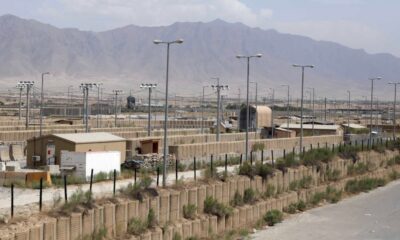
 Latest News4 days ago
Latest News4 days agoIEA rejects reports of US military planes landing at Afghanistan’s Bagram Air Base
-

 Latest News4 days ago
Latest News4 days agoTrump’s tariff pressure on Afghanistan ‘will impact economic growth’
-
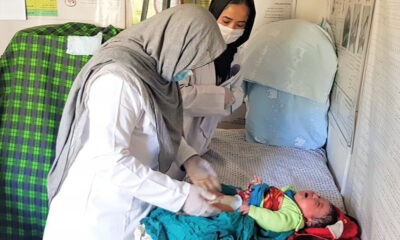
 Health4 days ago
Health4 days agoAid cuts could leave more women dying in pregnancy and birth, UN says
-

 Regional4 days ago
Regional4 days agoIran-backed militias in Iraq ready to disarm to avert Trump wrath
-
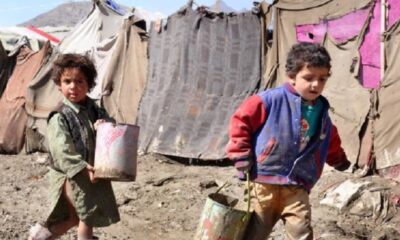
 Latest News4 days ago
Latest News4 days agoUN urges donors to keep up critical support for Afghanistan
-

 Latest News3 days ago
Latest News3 days agoItaly to welcome 700 Afghan refugees for resettlement
-

 Regional3 days ago
Regional3 days agoUS discusses tariffs, critical minerals, immigration with Pakistan
-

 Latest News4 days ago
Latest News4 days agoIran’s minister of trade and industry expected to visit Afghanistan








